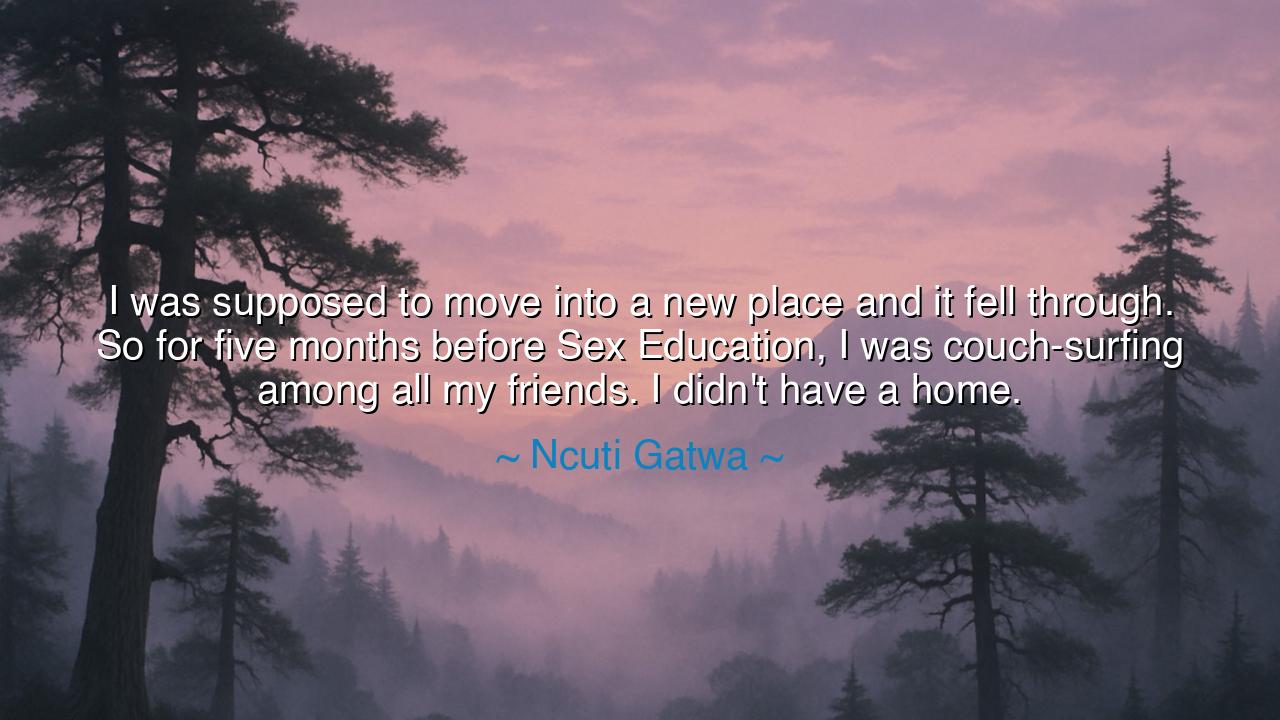
I was supposed to move into a new place and it fell through. So
I was supposed to move into a new place and it fell through. So for five months before Sex Education, I was couch-surfing among all my friends. I didn't have a home.






When Ncuti Gatwa, the Rwandan-Scottish actor known for his breakthrough role in Sex Education, confessed, “I was supposed to move into a new place and it fell through. So for five months before Sex Education, I was couch-surfing among all my friends. I didn't have a home,” he spoke not merely of hardship, but of the fragile space between despair and destiny. His words hold the echo of an ancient truth: that before light descends, the soul must often walk through darkness; before the summit, the traveler must sleep under the cold sky. In his story, we hear the pulse of every human heart that has wandered through uncertainty, clinging to faith, friendship, and resilience when all else has failed.
The origin of this quote lies in the uncertain period before Gatwa’s rise to fame. Having trained as an actor and struggled to find steady work, he faced rejection after rejection until even the simplest comfort—a home—slipped from his grasp. Yet in that time of wandering, he discovered not only the kindness of friends but the strength of his own spirit. Like many before him who have stood on the edge of obscurity before being called into greatness, Gatwa’s hardship became his crucible. When Sex Education finally came, it was not merely a role—it was a redemption, a transformation wrought through endurance and humility.
There is a sacred symbolism in being homeless, not just in the physical sense, but in the spiritual. Many of the greatest souls in history have walked without shelter before finding their place in the world. Socrates owned little, yet his mind built palaces of thought that still stand today. Jesus of Nazareth said, “Foxes have holes, and birds of the air have nests, but the Son of Man has nowhere to lay his head”—and yet His message built a spiritual home for billions. Likewise, Ncuti Gatwa, for a time without a roof, found a foundation far more enduring—the courage to continue. For in the absence of comfort, the human heart learns what it truly needs to survive.
Gatwa’s confession also speaks to the hidden face of success. The world often sees only the golden crown but not the thorns that preceded it. Behind every triumph, there are nights of hunger, self-doubt, and exhaustion. In his words, we see that success is not born in security, but in struggle. To couch-surf, to rely on the generosity of others, is humbling—it teaches gratitude and perspective. The man who has known such vulnerability leads with compassion; the artist who has suffered paints with truth. For it is the one who has been stripped of comfort who learns how to build meaning from nothing.
This story also reflects a deeper law of life: that hardship is not a detour from destiny—it is the pathway to it. The five months Gatwa spent without a home were not lost time; they were the forge in which his faith was tested and his humility refined. In that period, every act of kindness from his friends, every moment of exhaustion and doubt, shaped the man who would later inspire millions. The ancients understood this rhythm of fate. Odysseus wandered the seas for ten years before returning home, and in his wandering, he became the man worthy of that home. Likewise, Gatwa’s journey through instability was not an end, but a preparation—a cleansing of pride, a deepening of empathy, a sharpening of hunger for the life he was meant to live.
To the listener, the lesson is clear and timeless: do not despise your season of uncertainty. When the walls of comfort fall away, it is not always punishment—it may be initiation. The absence of a home can teach you where your true foundation lies; the loss of control can teach you where your strength truly comes from. In moments when the path collapses, remember that it may be clearing the way for something greater. Resilience is not born in comfort—it is born in chaos.
So let us take Ncuti Gatwa’s story as both a warning and a beacon. Life will test you before it blesses you. You may lose what you thought was necessary only to discover what is essential. You may find yourself without a home, yet surrounded by love; without wealth, yet rich in spirit. Perseverance, gratitude, and faith—these are the shelters that no misfortune can destroy. And when the dawn finally breaks, you will see that every night spent wandering prepared you for the light. For the soul that survives homelessness—of body, of hope, of certainty—builds a home that no storm can ever take away.






AAdministratorAdministrator
Welcome, honored guests. Please leave a comment, we will respond soon